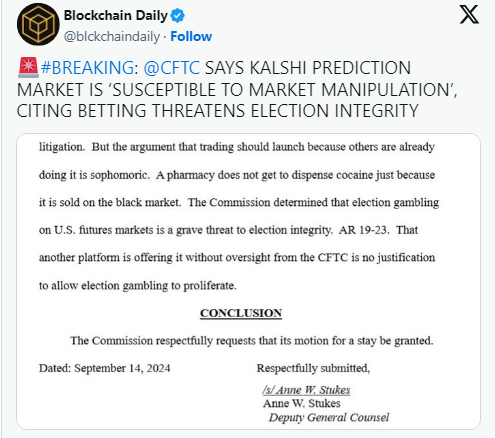In its most recent filing against Kalshi, a prediction market platform based in the United States, the U.S. Commodity Futures Trading Commission (CFTC) has expressed apprehensions regarding manipulating prediction markets.
The CFTC provided examples of recent manipulative actions on competitor platforms, which implies that Kalshi’s markets may encounter comparable challenges.
The CFTC referenced prior instances of prediction markets being exploited in a filing dated September 14.
Traders manipulated contracts on Polymarket
Traders on Polymarket were attempting to manipulate contracts related to the prospective victory of Vice President Kamala Harris in the 2024 U.S. presidential election. This was one example.
In addition, the pricing of contracts for Senator Debbie Stabenow’s reelection was substantially influenced by a fabricated poll on PredictIt, which indicated that musician Kid Rock was leading in a senate race.
Kalshi, which enables users to wager on election results, had previously encountered legal challenges from the CFTC.
According to a social media post by Kalshi’s proprietor, Tarek Mansour, District Court Judge Jia Cobb partially favored Kalshi on September 6, enabling the platform to provide election-related betting.

Nevertheless, the CFTC filed an emergency motion shortly after that, resulting in a provisional stay on Kalshi’s election markets on September 9.
Despite the legal obstacles, Kalshi momentarily launched its first U.S. election market on September 12. However, the platform was forced to remove the market a few hours later due to another stay order from the appeals court.
The CFTC filed a notice of appeal on the same day to contest the legality of Kalshi’s election wagering operations.
In her September 12 opinion, Judge Cobb criticized the CFTC’s actions, asserting that the regulator had exceeded its authority by attempting to close down Kalshi’s election markets.
Kalshi Says a Stay Would Cause Financial Harm
Kalshi contended that the company would suffer substantial financial losses if a halt were enforced while comparable products continued to operate on unregulated platforms.
Referring to this argument as “sophomoric,” the CFTC dismissed it in a filing on September 13.
The agency compared the situation to a pharmacy that sells illicit drugs solely because they are available on the black market, highlighting the potential for substantial harm to occur in the lead-up to the U.S. presidential election if election betting on Kalshi were permitted.
The fundamental issue in the legal dispute is whether U.S. gambling laws regulate Kalshi’s operations and, as a result, should be subject to the CFTC’s supervision.
The case remains unresolved, with additional legal challenges ahead, even though Judge Cobb’s ruling on September 6 was perceived as a victory for Kalshi and the broader cryptocurrency industry.
Last month, Bloomberg LP, a prominent provider of financial data and news services, announced that it intends to integrate election odds data from the crypto wagering platform Polymarket into its widely used Terminal.
Polymarket, a blockchain-based prediction market that operates on the Polygon network, has emerged as a prominent platform for monitoring real-time election probabilities.
The platform lets users wager on various event outcomes by utilizing smart contracts and transparent on-chain data for trade execution and payments.



